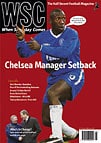 After years of belt-tightening regimes, Cardiff City have been on one long spree lately and Andrew Turton wonders what Sam Hammam's numbers will add up to in the end
After years of belt-tightening regimes, Cardiff City have been on one long spree lately and Andrew Turton wonders what Sam Hammam's numbers will add up to in the end
Tony Clemo struggled for years to keep it under control. Rick Wright wouldn’t even consider it. Samesh Kumar made sure it never got out of hand and Steve Borley used his own money, rather than risk its effect on the club. Yes, we’re talking about debt; more specifically, Cardiff City’s debt. In years gone by, we used to worry if the club’s borrowings reached a few hundred thousand. Now, after a decade of chair- men keeping a tight grip on the purse strings, Sam Hammam’s policy regarding debt is quite the opposite.
Cardiff’s drive to the top depends entirely on borrowed money and as a result, just four seasons since the current owner took control, the Bluebirds are massively in debt. Considering that when he took over Hammam cleared what small debts the club had, he certainly hasn’t wasted any time in accumulating some new ones. According to the latest set of accounts, the club’s borrowing at April 2003 had reached nearly £23 million. That’s in just three years – 12 months on, the figure is probably closer to £30m.
It’s not difficult to account for £10m of that total – it was spent on players to get us into the First Division. But it’s the wage bill that’s the real problem, reportedly running at some 110 per cent of turnover. Some signings came with big wages attached, while stars such as Daniel Gabbidon and Robert Earnshaw are on massive salaries, in a bid to prevent them being lured away to bigger clubs. Add to this the ground improvements, a phenomenal increase in back-room staff, plus the massive youth programme (recently awarded Academy status), and you begin to get some idea where all the money is going. In addition to all that, the club are paying out a fortune pushing the new stadium project along – simply getting to the planning stage has cost more than £1m. On the face of it the club are booming, but at what cost?
The total owed to our bankers is around £19m, with the rest owed to various bodies, including Hammam or one of his companies. In a similar move to that used by Kumar, it appears that the money Sam “invested” when he bought Cardiff City is being repaid to him – by the club. Tales of Sam pumping tens of millions into the club are completely untrue – he’s borrowed it all and it’s the club that are paying it back.
But there’s precious little in the way of assets to secure all that borrowing on and so it’s probably safe to assume that the debts are secured against our future income. Cardiff have to keep going forward, or they are going to be in big financial trouble – think Leeds United. Not that we’re filing for bankruptcy, or going into administration – far from it. But here we are, already saddled with at least £23m of debt, and it’s clear that we need to spend even more on players if we want to keep up that momentum. Are we about to come to a grinding halt?
So many clubs have tried this method and so many have failed, but none of this seems to trouble Sam. His reaction to scare stories is to announce that there is no problem and that everything is proceeding in accordance with an agreed business plan. Profits and income from the new stadium development will clear the borrowing and no decent player will be sold as the club strives for the Premiership. In fact, it all sounds great… so why are we still so worried?
Even the most ardent fan finds it hard to see how building (and paying for) a £60m stadium will reduce our debt. It’s also not clear how the club can make progress on the pitch while servicing such an enormous debt. But even in the face of all this, the majority of fans still have faith in Hammam. Perhaps some clarification of the way it all works would go some way to appeasing the doubters.
So, are Cardiff heading the same way as Bradford, Leeds, Leicester and a host of others? Or will the plan pay off, allowing us reach the Premiership and clear our debts? Even if Sam’s plan doesn’t work there are still plenty of options open to him. For example, he could sell off a share of the club and take on a partner whose input would clear the debt. Or he could sell up completely and leave the new owners to sort out the debts. Now, why does that sound so familiar?
From WSC 207 May 2004. What was happening this month